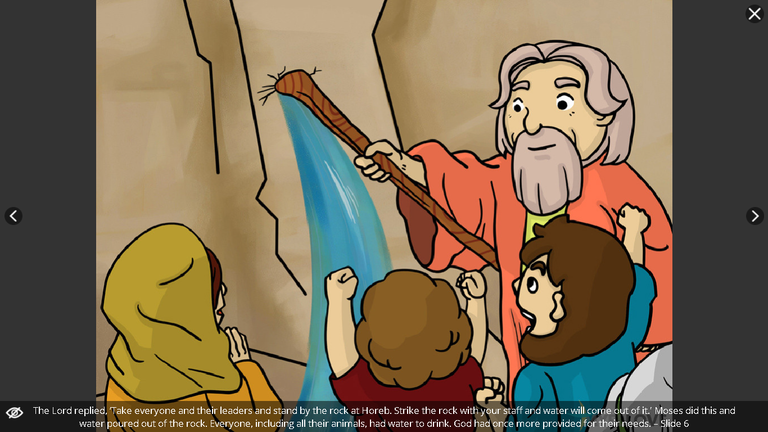From the Desert of Sin to Rephidim

So far, we have been following the wilderness journey of the Israelites during Moses' time after God delivered them from Egypt.
In their journey From Marah to Elim, we learned the important role of prayer and trusting God to provide solutions to problems and crises.
In From Elim to the Desert of Sin, we saw that the Jews of Moses' time never learned the important role of prayer and trust in God. Instead, they kept on complaining whenever they encountered a difficult problem. Moreover, the article emphasized that it is part of human nature to complain when hungry; that complaining exacerbates problems and reveals ignorance of God; and that despite their ingratitude, God still provides for His people.
Now, in this article, the Israelites were traveling from the Desert of Sin to Rephidim. This journey seems to be a repetition of what happened in Marah when the nation experienced a "water crisis."
However, since the word of God does not repeat anything without teaching us something significant, it is better to ask what lessons can we learn from this stage in Israel's journey.
It is possible to suffer the same old problem though you are doing the Lord's will.
. . . as the Lord commanded.
As I reflected on the narrative, the above phrase caught my attention. I think the issue here is that the Israelites experienced again an old problem though they were following God's commands.
As the Israelites traveled in the wilderness, they were mindful of God's command, and yet they encountered a problem similar to what they already struggled with in the past. This tells us that following the Lord's will does not mean an absence of difficulty. Many people got it wrong. Whenever they do what pleases God, they expect to live without a problem and whenever a problem arises, they immediately think that perhaps they displeased God in some way.
Living in the will of God and yet encountering great problems is not easy to resolve. Not unless, your faith is fixed in Him, it is easy to lose heart during this time because of the difficulty understanding your situation.
It is possible that you identify a legitimate problem but your response is mistaken.
The Jews at that time had a real problem. They had no water to drink. This problem is real and legitimate. It was not imaginary. It is but right that people will be concerned to address this legitimate need.
However, though the identification of the problem was accurate, the response was wrong. The fact that they quarreled and grumbled against Moses shows us that their obedience to the Lord's command was just a matter of external obedience and not a matter of the heart. Though they were following God's command, their heart and soul as a nation were not captivated by it.
The mistake in their response is that they focused their attention on Moses. However, from the perspective of Moses, he discerned accurately that the problem of the nation was far deeper than water or an economic crisis. In his mind, the response exposed that the real problem was spiritual; the nation had a problem with God.
In my economic blog, I wrote in 2014 my reflection on an essay published by R. B. Kuiper in 1948. Kuiper mentioned the generally accepted reason for the ascendancy of totalitarianism after WW1 and WW2. It was a prevalent idea that the neglect of spiritual values and widespread materialism prepared the way for totalitarian governments. Though Kuiper accepted that there was an element of truth to this popular idea, he identified them not as the roots, but as the symptoms of totalitarian ascendancy. Instead, in his mind, the real problem was "irreligion and false theology."
If you are suffering difficulty despite obeying the Lord's will, still the right response is to bring the matter into the Lord's hands.
It is easier to blame people and your situation whenever you encounter difficulty. Such a response won't solve the problem. Instead of complaining, the book of Exodus keeps reminding us that the right response is to bring your situation to the Lord's attention.
Imagine as a leader you are doing the right and yet people want to kill you. Perhaps, in Moses' mind, the people were unfair. Instead of giving respect, the people wanted to kill their leader thinking that such an action would solve their water crisis.
Moses' admirable quality amid crisis is that he brought his difficulties before the Lord. This is the only action that will solve the problem. God responded to his plea by telling him:
Walk ahead of the people. Take with you some of the elders of Israel and take in your hand the staff . . .
In The Staff of Moses, we learned how God used an ordinary piece of wood to perform miracles. God used the staff as a tool of judgment, deliverance, supply, and victory. By bringing the staff with Him, Moses was reminded of the display of God's power.
As to the nature of the miracle, we cannot find any natural explanation for it. Normally, water does not come from rocks using such a method of striking them. We don’t know how water came from the rock. All we know is that God performed a miracle.
Stories of miracles in the Bible are one of the reasons why most people reject it as primitive. No modern man can accept such a narrative. However, for those whose worldview is not confined to nature but includes even the unseen or the supernatural, nothing is impossible with God.
Conclusion
In Israel's journey from the Desert of Sin to Rephidim, we learned that it is possible to suffer a crisis though you are doing the right thing and to identify the problem but offer a wrong solution and that the only proper response no matter how difficult your problem is to bring it before the Lord in prayer.